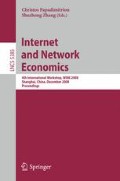Abstract
In many real-world settings (e.g., interdomain routing in the Internet) strategic agents are instructed to follow best-reply dynamics in asynchronous environments. In such settings players learn of each other’s actions via update messages that can be delayed or even lost. In particular, several players might update their actions simultaneously, or make choices based on outdated information. In this paper we analyze the convergence of best- (and better-)reply dynamics in asynchronous environments. We provide sufficient conditions, and necessary conditions for convergence in such settings, and also study the convergence-rate of these natural dynamics.
Access this chapter
Tax calculation will be finalised at checkout
Purchases are for personal use only
Preview
Unable to display preview. Download preview PDF.
References
Levin, H., Schapira, M., Zohar, A.: Interdomain routing and games. In: Proceedings of STOC 2008 (2008)
Osborne, M.J., Rubinstein, A.: A Course in Game Theory. MIT Press, Cambridge (1994)
Conitzer, V., Sandholm, T.: Communication complexity as a lower bound for learning in games
Hart, S., Mansour, Y.: The communication complexity of uncoupled Nash equilibrium procedures. In: Proceedings of STOC 2007 (2007)
Monderer, D., Shapley, L.: Potential games. Games and Economic Behavior (14), 124–143 (1996)
Rosenthal, R.W.: A class of games possessing pure-strategy Nash equilibria. Int. J. Game Theory (2), 65–67 (1973)
Nisan, N., Schapira, M., Zohar, A.: Asynchronous best-reply dynamics. Technical report, The Leibnitz Center for Research in Computer Science (2008)
Author information
Authors and Affiliations
Editor information
Editors and Affiliations
Rights and permissions
Copyright information
© 2008 Springer-Verlag Berlin Heidelberg
About this paper
Cite this paper
Nisan, N., Schapira, M., Zohar, A. (2008). Asynchronous Best-Reply Dynamics. In: Papadimitriou, C., Zhang, S. (eds) Internet and Network Economics. WINE 2008. Lecture Notes in Computer Science, vol 5385. Springer, Berlin, Heidelberg. https://doi.org/10.1007/978-3-540-92185-1_59
Download citation
DOI: https://doi.org/10.1007/978-3-540-92185-1_59
Publisher Name: Springer, Berlin, Heidelberg
Print ISBN: 978-3-540-92184-4
Online ISBN: 978-3-540-92185-1
eBook Packages: Computer ScienceComputer Science (R0)

